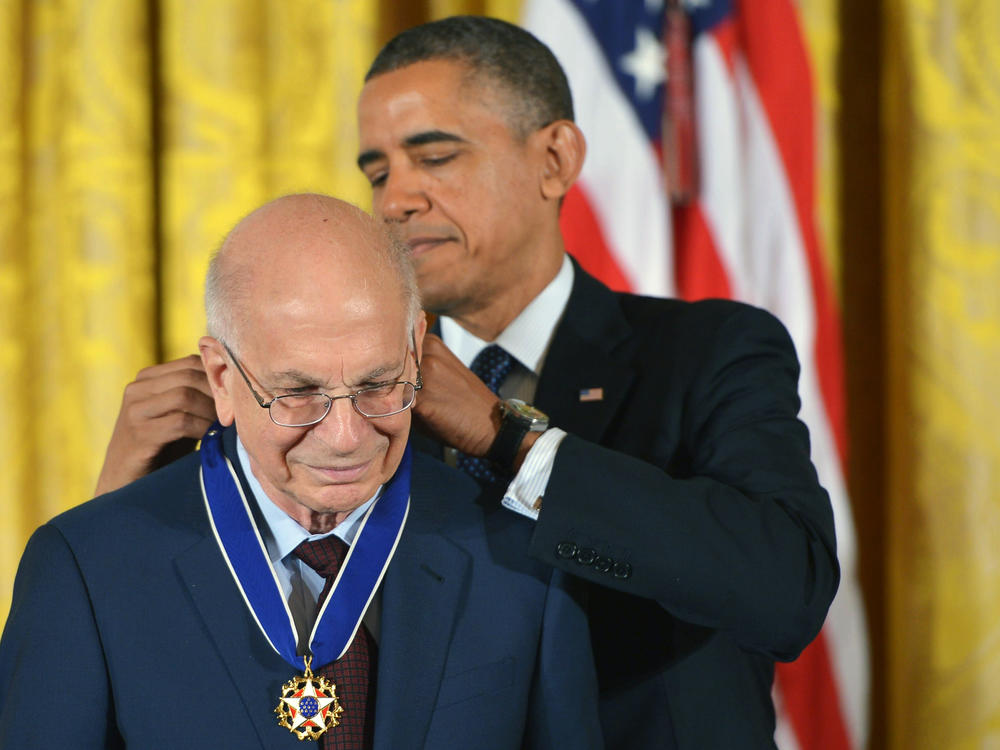Section Branding
Header Content
Best-selling psychologist of 'Thinking, Fast and Slow,' dies at 90
Primary Content
Daniel Kahneman, who understood that not all economic decision-making is strictly rational, has died at the age of 90. His research, which focused on the ways human psychology can warp rational thinking, was recognized with a Nobel Prize in 2002 and helped give rise to the burgeoning field known as "behavioral economics."
"Danny was a giant in the field," said Eldar Shafir, a professor at Princeton where a research center is named for Kahneman. "Many areas in the social sciences simply have not been the same since he arrived on the scene."
Kahneman, who also received the Presidential Medal of Freedom in 2013, credited much of his success to good fortune.
"My life was transformed by sheer luck," Kahneman told NPR's Hidden Brain in 2018. "Finding a partner, an intellectual partner, with whom we got along very well and we got a lot done."
Kahneman's longtime collaborator was Amos Tversky, who died in 1996. They were both trained as psychologists, and together they challenged the academic orthodoxy that people's economic behavior is strictly guided by rational thought. They identified many examples where decisions are shaped in ways that are irrational, but understandable — such as judges who grant parole more often after lunch than when they're hungry.
Another Nobel laureate, Richard Thaler, says Kahneman and Tversky broadened our understanding by asking a different question than most economists, who were steeped in mathematics, not psychology. Rather than asking what's the best or most efficient way to do something, and assuming that's what people do, they asked how people really behave.
Kahneman summarized those findings in his bestselling 2011 book, Thinking, Fast and Slow.
Some decisions are made slowly and deliberately, he wrote, in much the way that standard economic models describe. But others are swayed by snap judgments or short-cuts, which fall into predictable patterns. A gambler or an investor, for example, might take more risks after losing money in hopes of breaking even.
Sometimes, psychology tells us, the framing of an economic choice makes a big difference. Many consumers welcome the idea of a restaurant discount on certain nights of the week, but recoil at the notion of paying a surcharge at other times, as Wendy's recently discovered, even though in strict economic terms, there's no difference.
By accounting for those quirks, behavioral economics seeks to better understand people's decision-making and, in some cases, nudge them in more desirable directions.
"Clearly, the decision-making that we rely on in society is fallible," Kahneman told NPR's All Things Considered in 2011. "It's highly fallible, and we should know that."
Kahneman had his own psychological short-cuts, Thaler says, describing his friend an "avid pessimist."
"He always thought the worst would happen," Thaler recalls. "He claimed this was rational because he would not be disappointed as much with the outcomes of life."
Thaler, a self-described optimist, says he tried in vain to convince Kahneman to spend less time worrying.
"The fact that he lived to 90 in reasonably good health should have proven me right, but I made no progress in changing his mind."

